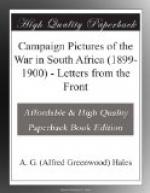The Third Division, which had been at Stormberg, and had done such excellent, though almost bloodless, work by sweeping the country between the last-named place and Bethany, rested at the latter place, and built up its full strength by incorporating a large number of men and guns. General Gatacre, who had retrieved his reverse at Stormberg by forcing Commandant Olivier to vacate his almost impregnable position without striking a blow, and later by his masterly move in swooping down on Bethulie Bridge and preventing the Boers from wrecking the line of communication between Lord Roberts and his supplies from Capetown, only remained long enough with his old command to see them equipped in a manner fit to take the field, and then retired in favour of General Chermside. It was under this officer that we marched away from the railway line across country known to be hostile to us. Almost due east we moved to Reddersburg, about twelve and a half miles. We had to move slowly and cautiously, because no living man can tell when, where, or how a Boer force will attack. They follow rules of their own, and laugh at all accepted theories of war, ancient or modern, and no general can afford to hold them cheap. A day and a half was spent at Reddersburg, and then the Third Division continued its eastward course in wretched weather, until Rosendal was arrived at. This is the spot where the Royal Irish Rifles and Northumberland Fusiliers had to surrender to the Boers. We had to camp there for the best part of three days on account of the continuous downpour of rain, which rendered the veldt tracks impassable for our transport. To push onward meant the absolute destruction of mules and oxen, and the consequent loss of food supplies, without which we were helpless, for in that country every man’s hand was against us, not only in regard to actual warfare, but in regard to forage for man and beast.
Here we were joined by General Rundle with the Eighth Division, which brought our force up to about thirteen thousand men, thirty big guns, and a number of Maxims. When the weather cleared slightly we moved onward slowly, the ground simply clinging to the wheels of the heavily laden waggons, until it seemed as if the very earth, as well as all that was on top of it, was opposed to our march. Our scouts constantly saw the enemy hovering on our front and flanks, and more than once exchanged shots with them. General Rundle, who was in supreme command, thus knew that he could not hope to surprise the wily foe, for it was evident to the merest tyro that the Boer leader was keeping a sharp eye upon our movements, and would not be taken at a disadvantage. We expected to measure the enemy’s fighting force at any hour, but it was not until about half-past ten on the morning of Friday, the 20th of April, that we were certain that he meant to measure his arms with ours, though early on that morning our scouts had brought in news that a commando, believed to be about two thousand five hundred strong,




